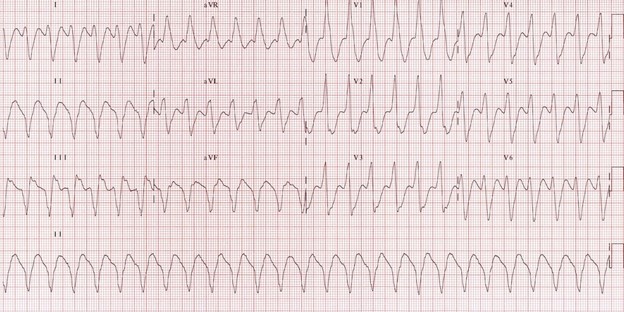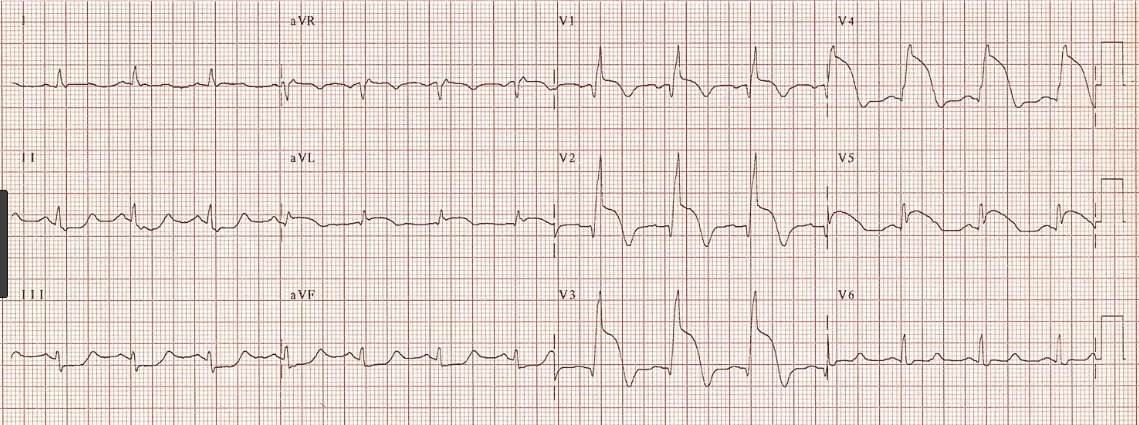Acute Coronary Syndrome Flashcard 7
Rationale
C. Rationale: Although not contraindicated, lidocaine is not listed in the ACS algorithm and is not routinely given to patients with ACS.
Question
Which of the following medications is not given routinely in the ACS algorithm:
a. Morphine
b. Nitroglycerin
c. Lidocaine
d. Aspirin
Answer
c. Lidocaine
Rationale
B. Rationale: NSAIDs (except aspirin) increase the “risk of mortality, reinfarction, hypertension, heart failure, and myocardial rupture.”
Question
Which of the following pharmacologic interventions is contraindicated for the treatment of ST elevation myocardial infarction?

a. Heparin
b. Celecoxib
c. Aspirin
d. Nitroglycerin
Answer
b. Celecoxib
Rationale
D. Rationale: The emergency medical services team can obtain a 12-lead ECG tracing in the field. This will guide the pre-hospital management of the patient with ACS. If ACS is confirmed, EMS can transfer the patient to a suitable institution where emergency PCI or fibrinolytic therapy can be provided. While in transit, EMS can give adjunctive therapies to prevent the progression of the disease.
Question
Which one of the following early diagnostic tools is useful in the pre-hospital management of acute coronary syndrome?
a. Oxygen saturation
b. End-tidal CO2
c. Cardiac troponins
d. 12-lead ECG
Answer
d. 12-lead ECG
Rationale
D. Rationale: According to the American Heart Association, ACLS providers and first responders are to routinely obtain a 12-lead ECG with patients at high risk for acute coronary syndrome.
Question
Which one of the following is the most important diagnostic testing to be requested in patients with a high probability of acute coronary syndrome?
a. INR, prothrombin time, activated thromboplastin time
b. 2D echocardiogram
c. Chest X-ray
d. 12-lead ECG
Answer
d. 12-lead ECG
Rationale
B. Rationale: Once certain that a patient has acute coronary syndrome, emergency dispatchers can instruct lay rescuers to have the patient chew aspirin. The correct dosage of 162 mg to 325 mg can be given to inhibit platelet function and prevent coronary re-occlusion.
Question
Which one of the following medications can be given to a patient with acute coronary syndrome in the pre-hospital setting by lay rescuers as instructed by emergency dispatchers?
a. Morphine
b. Aspirin
c. Nitroglycerine
d. Fentanyl
Answer
b. Aspirin
Rationale
A. Rationale: Patients with active peptic ulcer disease or other disorders affecting the upper gastrointestinal tract should not take aspirin due to the risk of bleeding. Disorders affecting the bowel or gall bladder would not be a contraindication to aspirin therapy.
Question
Which one of the following patients would you avoid giving aspirin to?
A. A patient who is being treated for peptic ulcer disease
B. A patient with a history of diverticular disease
C. A patient with a history of gallbladder disease
D. A patient who has recently undergone colonoscopy
Answer
A. A patient who is being treated for peptic ulcer disease
Rationale
B. Rationale: Nitroglycerin administration is to be avoided in patients with inadequate ventricular preload, including patients with right ventricular or inferior wall MI and patients with hypotension (SBP < 90 mm Hg), bradycardia (< 50 bpm), or tachycardia (> 100 bpm). Patients who have recently taken a phosphodiesterase inhibitor (tadalafil, vardenafil, sildenafil) may experience severe hypotension when given nitroglycerin or other nitrates.
Question
Which one of the following patients would you avoid giving nitroglycerin to?
A. A patient with a heart rate of 60 bpm
B. A patient who reports taking sildenafil citrate (Viagra) 12 hours ago
C. A patient with a systolic blood pressure of 98 mm Hg
D. A patient experiencing an anterolateral infarction
Answer
B. A patient who reports taking sildenafil citrate (Viagra) 12 hours ago
Rationale
D. Rationale: Both nitroglycerin and morphine worsen bradycardia, tachycardia, hypotension, and inferior wall myocardial infarction.
Question
You are an EMS first responder attending to a patient with acute coronary syndrome. In which one of the following scenarios is nitroglycerin or morphine contraindicated?

a. Blood pressure of 160/100 mm Hg
b. Crushing retrosternal chest discomfort
c. Heart rate of 100 bpm
d. Inferior wall myocardial infarction
Answer
d. Inferior wall myocardial infarction
Rationale
A. Rationale: This patient likely has an ST elevation myocardial infarction (STEMI). ST elevation is significant in leads II, III, aVL, aVF, and V1 to V5. A STEMI is a critical situation in which the patient must receive pre-hospital treatment with oxygen, aspirin, and morphine if feasible. The patient must also be brought to the nearest institution with an available cath lab as soon as possible. (Case: Acute Coronary Syndrome)
Question
You are in an outpatient clinic tending to a patient with chest pain and hypertension who has the following ECG tracing:
What is your diagnosis?

a. STEMI
b. NSTEMI
c. Stroke
d. PCI
Answer
a. STEMI
Rationale
C. Rationale: There is 2–5 mm ST segment elevation in leads V1 to V4, indicating infarction of the anteroseptal segment of the myocardium.
Question
You retrieve the ECG tracing of a 45-year-old woman that presented to the emergency department due to chest pain:
What is your diagnosis?
a. Normal sinus rhythm
b. Junctional rhythm
c. ST elevation MI
d. Myocardial ischemia
Answer
c. ST elevation MI